REEL MOTHERS: Movie reviews of I, Tonya, Three Billboards Outside Ebbing, Missouri by Howard Casner
Posted: December 14, 2017 | Author: Donald | Filed under: Uncategorized | Tags: Allison Janney, Craig Gillespie, I, John Hawks, Lucas Hedges, Margot Robbie, Martin McDonagh, McDormand, Missouri, Paul Walter Hauser, Peter Dinklage, Sam Rockwell, Sebastian Stan, Steven Rogers, Three Billboards Outside Ebbing, Tonya, Woody Harrelson, Zeljko Ivanek | 570 Comments » First, a word from our sponsors: I am now offering a new consultation service: so much emphasis has been given lately to the importance of the opening of your screenplay, I now offer coverage for the first twenty pages at the cost of $20.00. For those who don’t want to have full coverage on their screenplay at this time, but want to know how well their script is working with the opening pages, this is perfect for you. I’ll help you not lose the reader on page one.
First, a word from our sponsors: I am now offering a new consultation service: so much emphasis has been given lately to the importance of the opening of your screenplay, I now offer coverage for the first twenty pages at the cost of $20.00. For those who don’t want to have full coverage on their screenplay at this time, but want to know how well their script is working with the opening pages, this is perfect for you. I’ll help you not lose the reader on page one.
Ever wonder what a reader for a contest or agency thinks when he reads your screenplay? FosCheck out my new e-book published on Amazon: Rantings and Ravings of a Screenplay Reader, including my series of essays, What I Learned Reading for Contests This Year, and my film reviews of 2013. Only $2.99. http://ow.ly/xN31r
and check out my Script Consultation Services: http://ow.ly/HPxKE
Warning: SPOILERS
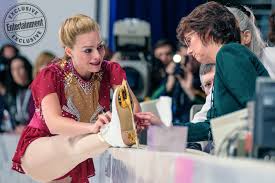 I, Tonya, the new film from writer Steven Rogers and director Craig Gillespie, is a fictional account of the ice skating scandal where the husband of skater Tonya Harding, along with her bodyguard, conspired to break the leg of Tonya’s main rival, Nancy Kerrigan.
I, Tonya, the new film from writer Steven Rogers and director Craig Gillespie, is a fictional account of the ice skating scandal where the husband of skater Tonya Harding, along with her bodyguard, conspired to break the leg of Tonya’s main rival, Nancy Kerrigan.
No matter what else it may be, I, Tonya is very successful and could easily be a real crowd pleaser. Structurally, it’s a forthright dramatization of the events punctuated with talking head interviews of the characters looking back on events. It’s often extremely funny and at times manages to show some empathy for the title character.
Though it is effective, it also at times feels a bit condescending and exploitive, as if the filmmakers were treating this as an elongated Jerry Springer show. So the laughs are sometimes a bit cruel and at the expense of the real life counterparts.
Les Girls: Movie Reviews of The Girl on the Train, Sand Storm, American Honey and Under the Shadow by Howard Casner
Posted: October 22, 2016 | Author: Donald | Filed under: Uncategorized | Tags: Allison Janney, Andrea Arnold, Avon Manshadi, Babak Anvari, Edgar Ramirez, Elite Zexer, Emily Blunt, Erin Cressida Wilson, Fish Tank, Haley Bennett, Justin Theroux, Lamas Amar, Laura Prepon, Lisa Kudrow, Luke Evans, Narjes Rashid, Paula Hawkins, Reba Blal, Rebecca Ferguson, Red Road, Riley Keough, Sand Storm, Sasha Lane, Shia LaBeouf, Tate Taylor, The Girl On the Train, Under the Shadow | Leave a comment »For questions: hcasner@aol.com
First, a word from our sponsors: I wanted to say thank you to everyone who contributed to our Indiegogo campaign for 15 Conversations in 10 Minutes. We did very well due to you folks. For those who weren’t able to give, keep us in your thoughts. And if you are able to contribute in the future, contact me and I’ll tell you how. I will even honor the perks on the original campaign.
I am now offering a new consultation service: so much emphasis has been given lately to the importance of the opening of your screenplay, I now offer coverage for the first twenty pages at the cost of $20.00. For those who don’t want to have full coverage on their screenplay at this time, but want to know how well their script is working with the opening pages, this is perfect for you. I’ll help you not lose the reader on page one.
Ever wonder what a reader for a contest or agency thinks when he reads your screenplay? FosCheck out my new e-book published on Amazon: Rantings and Ravings of a Screenplay Reader, including my series of essays, What I Learned Reading for Contests This Year, and my film reviews of 2013. Only $2.99. http://ow.ly/xN31r
and check out my Script Consultation Services: http://ow.ly/HPxKE
Warning: SPOILERS
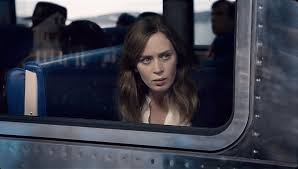 A few films have opened of late with the deadlier of the species front and center.
A few films have opened of late with the deadlier of the species front and center.
The one with the most hullabaloo (that’s 1960’s speak for buzz) is The Girl on the Train, based on a best seller by Paula Hawkins that falls into the subgenre of girl novels (as in Gone…, …in the Dark, and …with the Dragon Tattoo).
In this story, an alcoholic takes the same train to and from New York every day. She is especially obsessed with two houses she passes each time, one where her ex-husband lives with his new wife and child (and the alcoholic used to live), and one with a couple she’s created a fantasy world about in which they live a fairy tale existence. When the one from the fairy tale home turns up missing (which is sort of oxymoronic), she tries to figure out what happened, even though there’s a possibility she is the cause of it since she often has drinking black outs and can’t remember everything she did.
Though the story revolves around a group of women and their attempt to take control of their lives, with sisterhood coming firmly in first place, the attitude of the film towards women feels a bit retro with the same old tired tropes: woman are emotionally fragile beings who can easily be manipulated by men because, well, that’s just the way women are, poor creatures, as well as their lives being defined by motherhood (who can’t get pregnant, who can, and who is).
We’ve come a long way baby from I am woman, hear me roar. Read the rest of this entry »
THERE ARE NO SMALL PARTS: Movie reviews of Magic Mike XXL and Minions by Howard Casner
Posted: July 17, 2015 | Author: Donald | Filed under: Uncategorized | Tags: Allison Janney, Andie McDowell, Bryan Lynch, Channing Tatum, Despicable Me, Geoffrey Rush, Gregory Jacobs, Jennifer Saunders, Jon Hamm, Kyle Balda, Magic Mike XXL, Michael Keaton, Minions, Pierre Coffin, Reid Carolin, Sandra Bullock | 6,417 Comments »First, a word from our sponsors. Ever wonder what a reader for a contest or agency thinks when he reads your screenplay? Check out my new e-book published on Amazon: Rantings and Ravings of a Screenplay Reader, including my series of essays, What I Learned Reading for Contests This Year, and my film reviews of 2013. Only $2.99. http://ow.ly/xN31r
and check out my Script Consultation Services: http://ow.ly/HPxKE
Warning: SPOILERS
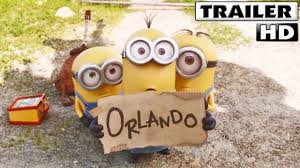 It’s not that common, but it’s also not completely unusual, for a supporting or minor character from a movie to be given a film of their own. This is more likely to happen in TV with spinoffs of popular TV series (Frazier, anyone?), but it does happen in tinsel town as well.
It’s not that common, but it’s also not completely unusual, for a supporting or minor character from a movie to be given a film of their own. This is more likely to happen in TV with spinoffs of popular TV series (Frazier, anyone?), but it does happen in tinsel town as well.
In Dead End, the Dead End Kids got their own franchise and when they grew up, they become The Bowery Boys. In The Egg and I, two of the minor characters, Ma and Pa Kettle, got their own series as well.
And in The White Sheik, Cabiria, a prostitute, via Federico Fellini, got her own vehicle in Nights of Cabiria; Ensign Pulver became the title character in the sequel to Mister Roberts (well, to be fair, Roberts was no longer around); and Ingmar Bergman’s From the Life of the Marionettes brings front and center the bickering couple who appear in the first episode of Scenes from a Marriage.
So in the past couple of weeks we’ve seen two more examples of the selfsame approach, though with a different emphasis in each outing and with much different results.
BIG: Movie reviews of Spy and Jurassic World by Howard Casner
Posted: June 18, 2015 | Author: Donald | Filed under: Uncategorized | Tags: Allison Janney, B.D. Wong, Ben Falcone, Bobby Cannavale, Bryce Dallas Howard, Chris Pratt, Colin Trevorrow, Irrfan Khan, Jake Johnson, Jason Statham, Jude Law, Jurassic World, Melissa McCarthy, Miranda Hart, Nick Robinson, Omar Sy, Paul Feig, Peter Serafinowicz, Rose Byrne, Simon Masrani, Spy, Ty Simpkins, Vincent D’Onofrio | Leave a comment »First, a word from our sponsors. Ever wonder what a reader for a contest or agency thinks when he reads your screenplay? Check out my new e-book published on Amazon: Rantings and Ravings of a Screenplay Reader, including my series of essays, What I Learned Reading for Contests This Year, and my film reviews of 2013. Only $2.99. http://ow.ly/xN31r
and check out my Script Consultation Services: http://ow.ly/HPxKE
Warning: SPOILERS
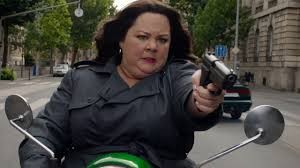 Are you having a bad day? Things not going well? Are you a bit down in the dumps?
Are you having a bad day? Things not going well? Are you a bit down in the dumps?
Well, if you want to feel a bit better about yourself and life in general, I can hardly recommend a more effective drop of medicine than Spy, the new espionage comedy starring Melissa McCarthy as Susan Cooper, the unprepossessing agent’s assistant with the unprepossessing name who turns into one bad un-unprepossessing ass of a Jane Bond.
What can I say? I came out of the movie theater feeling wonderful, simply wonderful, ready to take on the vicissitudes of life and the slings and arrows of outrageous fortune once again.
Now, I do have to be honest. Based on remarks I’ve seen on facebook, how you react to the movie will probably depend on how you feel about Ms. McCarthy. If you don’t like her particular brand of comedy persona, the movie may affect you more like a fallen soufflé.
I happen to think she’s an exploding nova of a comic talent. Read the rest of this entry »
@#%!!&# Movie Reviews of Bad Words and On My Way by Howard Casner
Posted: April 4, 2014 | Author: Donald | Filed under: Uncategorized | Tags: Allison Janney, Andrew Dodge, Bad Words, Catherine Denueve, Emmanuelle Bercot, Jason Bateman, Jerome Tonnerre, Kathryn Hahn, On My Way, Rohan Chand | 557 Comments »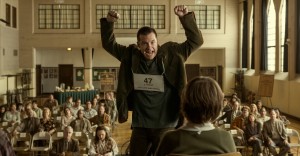 It’s easy to see why Jason Bateman wanted to make Bad Words, the new Bad Santa clone written by new comer Andrew Dodge and directed by and starring Mssr. Bateman. It’s a solid vehicle to show off his middle brow, laid back talents and he certainly makes the most of it. He wears the role like a comfy old sweater owned since college that you just can’t bring yourself to get rid of, complete with impeccable comic timing.
It’s easy to see why Jason Bateman wanted to make Bad Words, the new Bad Santa clone written by new comer Andrew Dodge and directed by and starring Mssr. Bateman. It’s a solid vehicle to show off his middle brow, laid back talents and he certainly makes the most of it. He wears the role like a comfy old sweater owned since college that you just can’t bring yourself to get rid of, complete with impeccable comic timing.
It’s also a very entertaining movie. It’s witty and clever and never boring. It’s often a ton of fun. It’s very well crafted.
In fact, it’s so well made that it’s quite easy to overlook the fact that it’s really quite a terrible, terrible film. Read the rest of this entry »
Movie Reviews of FRUITVALE STATION, THE WAY, WAY BACK and BLUE JASMINE by Howard Casner
Posted: August 8, 2013 | Author: Donald | Filed under: Uncategorized | Tags: Alec Baldwin, Allison Janney, Andrew Dice Clay, Blue Jasmine, Cate Blanchette, Fruitvale Station, Jim Rash, Liam James, Maya Rudolph, Michael B. Jordan, Nat Faxon, Peter Sarsgaard, Ryan Cooglar, Sally Hawkins, Sam Rockwell, Steve Carrell, The Way, Toni Collette, Way Back, Woody Allen | 2 Comments »The movie Fruitvale Station has a horrific finale, a fevered, shaking camera dramatization of a terrible, tragic incident. It’s also the main reason to see the film. It’s a disturbing, chaotic and frustrating set of scenes and makes you very angry. So if nothing else, the movie has certainly achieved something here. At the same time, as a whole, the movie never really connected with me. The rest of the film is a chronicle of the events, a day in the life of type thing, of the central character, Oscar Grant, a young man with a difficult background spending his last day on earth without knowing his time is running out.
How you feel about the film will probably depend upon how you feel about this character. Oscar (played sincerely and solidly by Michael B. Jordan) is a petty drug dealer who has been in and out of prison. He’s also a compulsive liar; a player; has anger management issues; and refuses to take any responsibility for how his life has turned out. He’s the sort of guy who tells his girlfriend and mother of his child that that last affair he recently had, you know the one, well, hey, now, babe, that meant nothing and it’s over and I’m a new guy now; then in the next scene, he’s flirting with a young woman at the store he once worked at. He’s also the kind of guy who threatens his ex-box with bodily harm if he won’t give him his job back, the job he lost from constantly showing up late (at another time, he threatens to urinate on a poor store owner’s entranceway if he won’t let some friends of his use the store bathroom—you see a pattern here).
After all that, he should be fascinating. He’s the sort of character that I go to movies to see. But Oscar isn’t. In fact, he’s sort of familiar and the kind of character we’ve seen many times in movies before. There’s nothing that particularly unique or vibrant about him. He’s even a bit bland, when all is said and done. Hard to believe when one reads the description above, but that was pretty much it for me.
I think because of this, once the emotional effect of the horrific incident at Fruitvale Station wore off, I thought: okay, it was a terrible event, but I’m still not sure why the writer/director Ryan Cooglar made the movie. The tragedy at the end is not presented in a way that is a commentary on Oscar’s life, though one gets the feeling that Cooglar wants it to be in some way. Instead, it’s unclear Cooglar offers any real insight to the situation or has anything to say about it other than, well, than “shit happens”. Which, actually, is a perfectly fine theme; it’s just unclear that this was Cooglar’s intention.
I do highly recommend a film with a similar situation, The Murder of Stephen Lawrence, written and directed by Paul Greenglass, also a true story about a black teenager who was shot and killed by police officers for unclear reasons; this time in England. It’s a tension filled story that grabs you from the beginning and refuses to let go. Fruitvale Station felt a bit too leisurely to me.
Over the past couple of years, two genres of film seem to have dominated the silver screen: the coming of age film (from Moonlight Kingdom to The Perks of Being a Wildflower to The Kings of Summer to The Bling Ring to The To Do List) and the film apocalypse (from It’s a Disaster to This is the End to The World’s End to World War Z to almost any movie based on a super hero). I’m not sure what this means. I can’t say that it’s a particularly optimistic view of the world to say that just when one takes the first steps toward being an adult you’re shit out of luck because the world’s about to bite you in the ass big time.
The latest foray into the coming of age category is The Way, Way Back, a story about a teen, Duncan (played satisfactorily by Liam James), having to spend a couple of weeks at a beach house with his mother Pam and her new boyfriend Trent, who treats Duncan like a cockroach to be stomped on. While The Kings of Summer is a more ambitious film, The Way, Way Back is actually more satisfying if for no other reason that while the kids in the former film are nothing but spoiled brats who don’t know when they are well off, the hero in the latter film is in a near nightmarish situation in which he is more sinned against that sinning.
But like many films in this popular genre, The Way, Way Back is fun and entertaining and even moving at times, while not really bringing anything new to the table and it all feels rather formulaic. What it does have is some very nice acting, especially from Sam Rockwell in the Bill Murray role, as Owen, the manager of a swimming park who takes pity on the depressed Duncan and becomes the true father figure that Trent (Steve Carrell, giving it his all, while at the same time, never seeming comfortable in the roll and always looking miscast) could never be. Giving more than able support is Toni Collette as the scared and desperate Pam; Allison Janney, hysterical as Betty, the alcoholic in the making next door neighbor; and Maya Rudolph as Owen’s long suffering co-worker.
Perhaps the most original and intriguing aspect of the screenplay (by Nat Faxon and Jim Rash, who also directed) is the character of Betty. In many ways, she treats her kids in the same inexcusably awful manner as Trent treats the kids under his roof. But while Trent leaves you with the feeling that he’s one degree off from becoming Ted Bundy, it’s obvious that Betty and her kids all love each other very much. It’s a clever juxtaposition.
But in the end, does it really matter? The way things are going in the movies these days, all the characters are going to die in a couple of years anyway.
Blue Jasmine is a character study of a faded Northern bell. Any resemblance to A Streetcar Named Desire is purely unintentional, I’m sure (and I have the deed to the Brooklyn Bridge in my pocket). But though written and directed by the great Woody Allen, it feels like a screenplay written by someone who had no emotional attachment to anyone in the film or anything that is going on in it as well. And when it’s all over, you go: fair enough, but exactly why was it made?
It stars Cate Blanchette as Jasmine, a woman married to a Bernie Madoff type (Alec Baldwin) who loses all her upper class trappings when her husband is arrested and the IRS and the court take everything she owns. She moves to San Francisco to live with her sister Ginger, someone she feels too superior to to really want to have anything to do with (Sally Hawkins). The story is told in a rather clunky manner with tons of expository dialog and some distracting side trips (mainly dealing with the Ginger’s love life) that just get in the way of Jasmine’s central through line.
The plot is often not that believable; Jasmine takes a computer course for some reason that never made sense—she claims to be computer illiterate, but no one in her social background is this obtuse. She also has a romance with a politician on the rise (Peter Sarsgaard), someone who works for the State Department yet still has enough money to buy a second home only Donald Trump could afford (okay, I’m exaggerating, but you get my drift). This subplot is so questionable that one is expecting Sarsgaard’s character to turn out to be a con man of some sort with the intent of Jasmine getting a taste of her own medicine; but no, he is exactly what he seems. And that’s without mentioning a surprise ending that only poses more questions than it answers.
On the plus side, this is a movie that is cast within an inch of its life. Everyone is excellent and some, like Hawkins and Blanchett, are brilliant. Perhaps most surprising Is Andrew Dice Clay who is spot on as Hawkins’ working class ex-husband (who knew that Clay could actually have had an acting career if he hadn’t been such a jerk). But in many ways, that is almost all Blue Jasmine has. Whether that is enough, is up to you.
Movie Reviews of THE ORANGES and DIANA VREELAND: THE EYE HAS TO WANDER by Howard Casner
Posted: October 13, 2012 | Author: Donald | Filed under: Uncategorized | Tags: Alia Shawkat, Allison Janney, Annette Miller, Bent-Jorgen Perlmutt, Catherine Keener, Diana Vreeland: The Eyes Has To Wander, Frederic Tcheng, Hugh Laurie, Ian Helfer, Immordine Vreeland, Jay Reiss, Julian Farino, Oliver Platt, The Oranges | 5 Comments »The Oranges, the new film written by Ian Helfer and Jay Reiss and directed by Julian Farino, feels as if it’s about a group of suburbanites who would like to be in a John Updyke book, but can’t seem to get up the energy for it. It’s a character study of three marriages, two straight ones as well as the Boston or faux homosexual one of the two husbands. And if you don’t know which one is of most concern to the writers, then you obviously have never heard the term bros before hos. The movie is all about what happens when one husband starts an affair with the other husband’s daughter. At least I assume it’s an affair. No sex is shown and it all ends up being a bit cute and cuddly, as if they were afraid the Lifetime channel might not want to air it. The whole thing is narrated by Alia Shawkat, who plays the daughter who doesn’t have an affair. Exactly why this character was chosen for this somewhat thankless task is a bit unclear. The movie is filled with scenes she doesn’t see first hand and she never seems to learn anything of any significance. The movie might have been interesting if it had been about her realization that nobody likes or cares about her because she’s too plain and dull to be of any importance (so unimportant that even her father prefers the daughter across the street). But alas, twas not to be. The leads are played by Allison Janney, Oliver Platt, Catherine Keener and Hugh Laurie. All are very good, but apparently all are here because no one has come up with the idea of using them for a movie version of Edward Albee’s A Delicate Balance yet. Maybe next year.
Diana Vreeland: The Eye Has to Travel (the new documentary directed by Lisa Immordine Vreeland, Bent-Jorgen Perlmutt and Frederic Tcheng) is about the ground breaking American fashionista that revolutionized the way we thought about what we wear though the pages of Harper’s Bazarre, Vogue and the Metropolitan Museum of Art. In the movie, Vreeland is portrayed as Auntie Mame meets Anna Wintour: someone who cries out Live!, Live!, Live!, but still makes her assistants cry. It’s based on an as told to biography written by George Plimpton and is narrated by two people pretending to be Plimpton and Vreeland reading excerpts of the book and the interviews. The actor playing Plimpton is fine, but Annette Miller, as Vreeland, is a bit much at times. She has the voice of Lauren Bacall coupled with the vocal inflections of Bette Davis. I’m not convinced the film rises about what is, a fairly standard bio doc, but it is highly entertaining and at times fascinating (though one does get a chill here and there when Vreeland seems to see her sons as utterly unimportant to her life).











